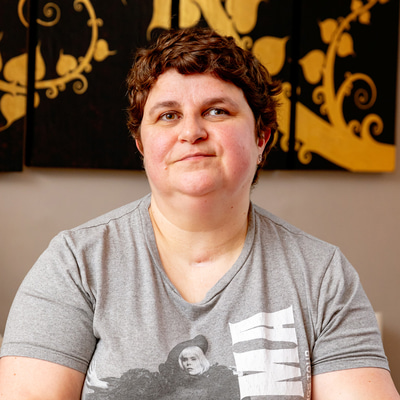Thousands denied support after sight loss diagnosis
Delays in access to vision rehabilitation have caused a “hidden social care scandal,” RNIB says

11 March 2024
Thousands of blind and partially sighted people are being denied their right to vision rehabilitation after sight loss, the Royal National Institute of Blind People (RNIB) has revealed.
More than a quarter of local authorities (26%) have left vulnerable adults waiting more than a year for support.
Almost nine out of 10 (86%) are have taken more than 28 days to explore a person’s needs after sight loss.
RNIB called the lack of support for those attempting to rebuild their life after sight loss a “hidden social care scandal.”
Vision rehabilitation is a a form of adult social care that supports blind and partially sighted people to retain their skills and confidence by developing new ways of doing everyday tasks.
Services can include mobility and white cane training, emotional support, the development of assistive technology skills, and guidance on how to cook and shop independently.
It provides the first step towards regaining normality for those with sight loss, RNIB said.
Those with sight loss are legally entitled to vision rehabilitation, and those who do not receive it are at increased risk of physical injury and of experiencing mental health problems. Lack of support can also lead to an increased risk of isolation, the charity emphasised.
The statistics are published in RNIB’s Out of Sight: The Hidden Scandal of Vision Rehabilitation Services Across England report, published today (11 March).
The findings were brought about through a Freedom of Information (FOI) request to 153 local authorities in England, made by the RNIB.
“It’s absolutely essential”
Charmaine Ashpole, from Brent, accessed vision rehabilitation after meningitis left her with a severe sight and hearing impairment in 2018.
Ashpole emphasised that communication is key, especially if vision support is delayed.
“If they’re waiting nine months, or even more, you need to be on the phone to those people, giving some sort of emotional support in the meantime, not just leaving them wondering when someone is going to talk to them,” she said. “That person needs to speak to a reassuring human, with critical emotional support in the meantime.”
The report also highlighted how underfunding of councils in England has led to gaps in support. Non-specialists are being used to undertake vital assessments in 26% of areas, while some local authorities have no vision rehabilitation specialists at all.
People at all stages of sight loss are “being let down by a forgotten, under-resourced social care service, operating without scrutiny and with a veritable patchwork provision of care,” RNIB said.
Ashpole’s own vision rehabilitation specialist was incredibly caring, she said, but it was clear from the outset that she needed more support.
Ashpole emphasised that for every person seen managing with a sight impairment in the community, “there are so many more people who are stuck at home, and are terrified to get out of their houses without that vision rehabilitation support.”
She added: “They might not even realise that it [the support] can be such a lifeline. I wouldn’t be able to get out at all without it.”
Ashpole believes that MPs who are responsible for decisions on council funding “really need to understand what it's like without sight – whether to suddenly go blind, or if you've got deteriorating illness.”
Vivienne Francis, RNIB’s chief social change officer, said: “We know that local authorities in England are struggling to cope with the rise in demand for vision rehabilitation services, and to resource the service effectively.
“However, threadbare services mean that thousands of blind and partially sighted people wait often more than 12 months without the support they’re entitled to so they can live their lives to the full.”
She added: “This hidden social care injustice needs to be fixed – we’re calling on all UK political parties to commit to ensuring people with sight loss get the emotional and practical support they need, when they need it.”
An unregulated service
As a preventative service, vision rehabilitation is the only specially assessed adult social care service not to be monitored by a care regulator. This means delays have been allowed to pass unnoticed, RNIB said.
Francis said: “Life changes after sight loss, sometimes overnight, often in dramatic ways. By law, support must be provided through specialist vision rehabilitation services run by local councils or contracted out to third parties, but our FOI report shows the service is completely unregulated, with a patchwork provision of care leaving people with sight loss falling through the cracks.”
The charity is calling for vision rehabilitation to be regulated and monitored in the same way as other adult social care services.
This could be enabled legislatively by extending the remit of the Care Quality Commission, RNIB said.
The charity is calling for the National Institute for Health and Care Excellence (NICE) to develop guidelines and quality standards, with local authorities publishing their own results annually.
RNIB is also recommending that vision rehabilitation specialists are made a regulated profession, recognising their skill and expertise.
Better integration of services, including improved links between secondary and social care settings, and a guaranteed route into vision rehabilitation for everyone who needs it, would make blind and partially sighted people more aware of their rights and the services they can expect to receive, RNIB said.
Dave Aldwinkle, RNIB director of insight and customer voice, emphasised the importance of the charity’s specific policy asks.
“We’re asking the government to take vision rehabilitation much more seriously, and to recognise that, as the only part of social care that is unregulated, it has fallen by the wayside in comparison to anything else,” Aldwinkle said.
He added: “When you lose your vision, you can get driven into a sense of isolation: that you’re the only person that this is happening to, and you can’t see that there is a future where your life gets back onto an even keel, and you can continue to live your life and be the person that you were before.
“Vision rehab provides a hugely important bridge into that new world. Without it, people can be left for years, waiting for their life to get better, causing huge psychological and health issues, particularly mental health, but also a lot of economic and lifestyle problems.
“We know a huge number of people leave work very soon after getting a diagnosis. Timely vision rehab would avoid a lot of those costs, both personal and societal. We want the government to see the importance of this and to take it seriously.”
Aldwinkle continued: “In more specific terms, we want them to bring regulation to the industry, and make rehabilitation and habitation officers a regulated workforce. We want them to instruct NICE to produce a quality and standards framework that would outline what is expected, what good looks like, and to ensure that local authorities are required to publish data against their performance.”
He added: “The most important thing is that people will get the services and the support that legally they’re entitled to. This was given as a right, a number of years ago, because of its importance. In practice, that right has fallen away, and people haven’t been able to get the help that they need.”
The RNIB sees people every day who have received good primary and secondary healthcare but have been let down when it comes to vision rehabilitation, Aldwinkle said, adding that it is an issue across the whole country.
“Joining up and making sure we’ve got a seamless transition, from the health environment of primary and secondary care, into the social environment, is absolutely critical,” he said. “It is one thing getting good medical care, but without the follow-up people are abandoned.”
He emphasised that RNIB wants to be part of the solution: “It’s such an important thing for us, to try and address this. We want to get out and find solutions. Being ready to support with all the things that we’re asking for as part of our message,” he said.
Speaking about life after her sight loss and the value of vision rehabilitation, Ashpole said: “We need to be trained to live again – to use our other senses in a way that can help us navigate and orientate ourselves and live our best lives, and get around in the way that sighted people can in a very sighted, harried, busy, frenetic, cash-strapped world.”
“We can’t turn our eyesight back on,” she added.
RNIB has launched a petition outlining its key policy asks. It can be signed here.
A tool showing waiting times for vision rehabilitation in certain areas has also been created.
Lack of support: the impact

Terry Quinn, 59, from West Yorkshire, described how lack of vision rehabilitation left him “a shell of his former self.”
Quinn, who has diabetic retinopathy, lost his job and driving license after registering as severely sight impaired in 2019.
“I had to give up my beloved job and career and found myself in despair,” he said. “Over time, I spiralled. I would spend days and weeks in the house by myself, not daring to go out.”
He added: “I didn’t want to see friends anymore, as I didn’t want them to see this pathetic thing that I had become – this person that could no longer find a chair to sit at, could no longer find my cup or glass, or even make my own drink.”
A Certificate of Vision Impairment form had been filled in at the hospital and he had been told that the local authority would be in touch to discuss vision rehabilitation, Quinn said – but the call never came.
“I have never felt so alone in my entire life,” Quinn said. “I had gone from a successful NHS senior manager, then self-employed businessman – confident, great social life. Now I had absolutely nothing to contribute whatsoever. I could no longer see my son’s face, my partner’s face, or even my own.”
A routine appointment at a low vision clinic saw an intervention with the local authority being made on his behalf, and eventually communication made with a local vision rehabilitation specialist.
The specialist, who himself was severely sight impaired, visited Quinn at home, sharing information, helping him to organise a travel pass and concessions, and training him on how to use a cane and find the kerb outside.
“I would cry buckets at every appointment, but he made me think more positively,” Quinn said.
He explained that seeing someone with a visual impairment being able to do most things independently led him to believe that he would be able to too.
Internet research eventually led Quinn to Guide Dogs UK, and he took home his guide dog, Spencer, in March 2020.
Now, Quinn says, “I fear nothing. I am independent. My partner and friends say it is like having the old Terry back."
He added: “We travel the world, on planes, cruise ships, trains, buses. I go away with my partner and guide dog. Life really is the best.”


Comments (0)
You must be logged in to join the discussion. Log in